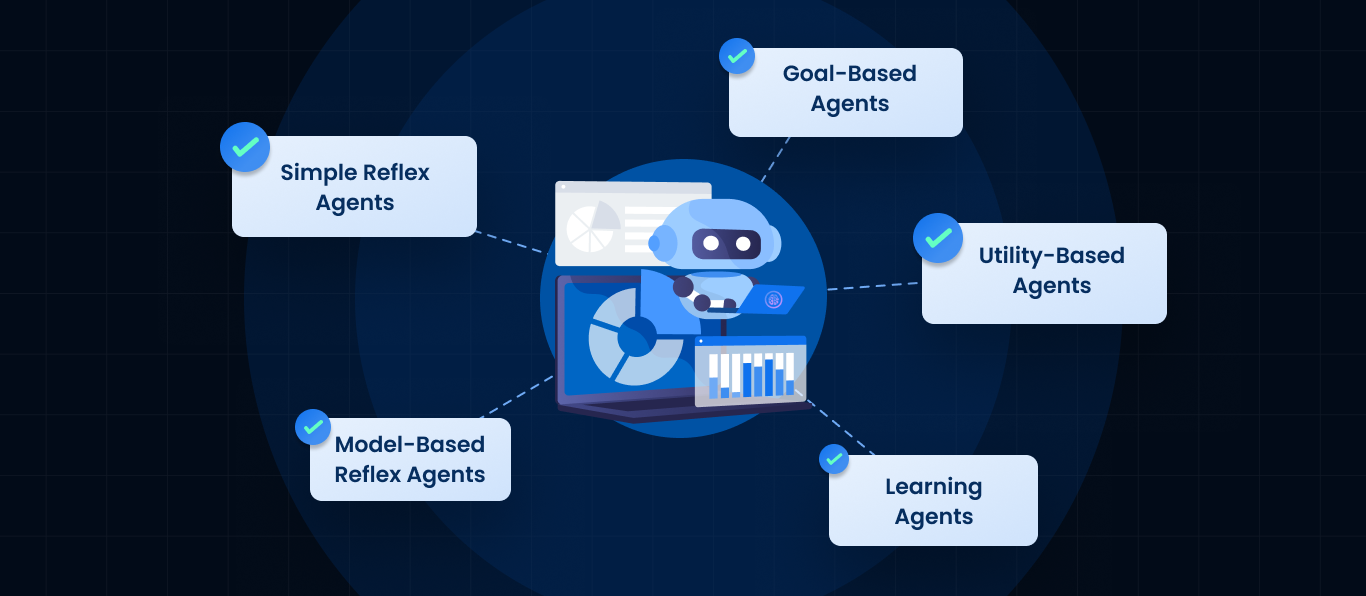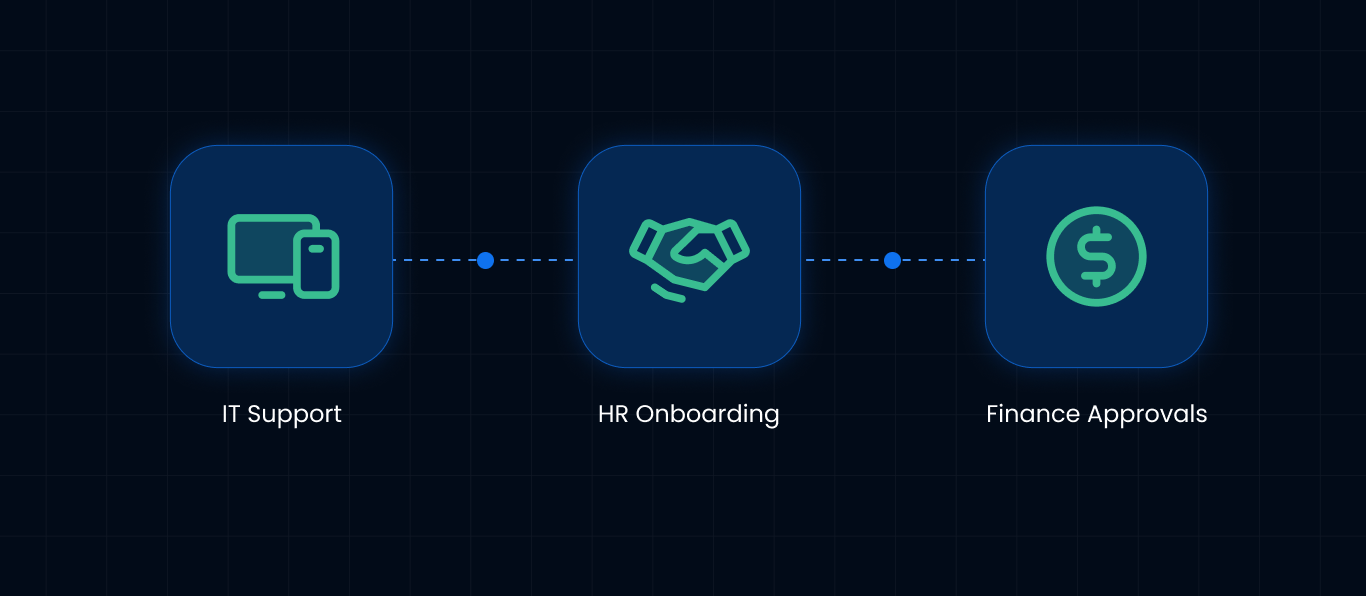Introduction
As a technology leader in a large US company, you’re constantly thinking about the next big thing. You’re not just managing ticketing systems; you’re architecting the future of work. And in that future, the different types of AI agents are the star players.
But let’s be honest, the term “AI” gets thrown around a lot. It can feel like a buzzword without much substance. You’ve probably seen countless demos of so-called “intelligent” chatbots that are anything but.
This guide is different. We’re going to cut through the noise and talk about the different types of AI agents in a way that matters to you. We’ll explore how these agents are evolving and how they can help you not just clear tickets, but create a truly intelligent, proactive, and resilient support ecosystem for your employees.
Ready to meet your new digital workforce? Let’s dive in.
What Is an AI Agent?
At its core, an AI agent is a smart program that can perceive its environment and take actions to achieve a specific goal. Think of it as a digital employee that can understand, reason, and act on its own.
But not all AI agents are created equal. Just like you have different specialists on your team, there are different types of AI agents, each with its own unique skills and abilities. Understanding these differences is key to building a successful AI strategy.
The 5 Core Types of AI Agents You Should Know
To truly appreciate the power of modern AI, it helps to understand the foundational types of AI agents that have led us to where we are today. While some of these are simpler, they provide the building blocks for the sophisticated systems you can deploy in your enterprise.

- Simple Reflex Agents: These are the most basic types of AI agents. They operate on a simple “if-then” logic. For example, if a user types “password reset,” the agent responds with a link to the password reset tool. They don’t have memory or consider past actions.
- Model-Based Reflex Agents: A step up from simple reflex agents, these types of AI agents can maintain an internal “model” of the world. This allows them to handle situations that aren’t immediately obvious. For example, if a user says their screen is frozen, the agent can infer that a reboot might be the best first step, even if the user didn’t explicitly ask for it.
- Goal-Based Agents: These types of AI agents are focused on achieving a specific goal. They can plan a sequence of actions to get from point A to point B. For example, if a new employee needs access to five different software applications, a goal-based agent can plot out the most efficient way to provision that access, even if it involves multiple steps and systems.
- Utility-Based Agents: These are the pragmatists of the AI world. They not only have a goal but also a way to measure how “good” a particular outcome is. This allows them to make trade-offs. For example, if there are two ways to solve a problem, a utility-based agent can choose the one that is faster, more cost-effective, or results in higher employee satisfaction.
- Learning Agents: These are the most advanced types of AI agents. They can learn from their experiences and improve their performance over time. A learning agent might notice that a particular knowledge base article is consistently leading to unresolved tickets. It can then flag that article for review or even suggest improvements.
Reactive vs. Deliberative vs. Hybrid Agents: A Quick Comparison
Another way to categorize types of AI agents is by how they think and act.
- Reactive agents are all about speed. They respond to immediate stimuli without much deliberation. Simple reflex and model-based agents fall into this category.
- Deliberative agents are the thinkers. They take their time to analyze the situation, consider their options, and make a plan. Goal-based and utility-based agents are deliberative.
- Hybrid agents offer the best of both worlds. They have a reactive component for quick responses and a deliberative component for more complex problem-solving. This is the direction that most modern enterprise AI is heading.
Agentic Systems & Multi-Agent Coordination: The Future is a Team Sport
Now, let’s talk about where things get really exciting. The true power of AI isn’t in a single agent, but in a team of agents working together. This is the world of agentic systems and multi-agent coordination.
Imagine an ecosystem where different types of AI agents collaborate to solve problems:
- A Frontline Responder (a highly advanced reactive agent) fields the initial employee request. It can understand not just text but also screenshots and even short videos of the problem.
- It then routes the request to the appropriate Specialist Agent (a deliberative, goal-based agent). This could be an agent that specializes in HR, Finance, or IT issues.
- The Specialist Agent then gets to work, accessing different systems, running diagnostics, and taking action to resolve the issue.
- Meanwhile, a Proactive Sentinel (a learning agent) is monitoring your systems in the background, looking for potential problems before they even impact your employees.
- And overseeing it all is an Orchestrator Agent, a master agent that ensures all the other agents are working together seamlessly.
This is the future of enterprise support. It’s not about replacing humans, but about augmenting them with a powerful digital workforce.
Applications and Enterprise Use Cases: Putting AI Agents to Work
So, what does this look like in practice? Here are a few examples of how different types of AI agents can be used in a large enterprise:

IT Support
An employee can’t connect to the VPN. They send a message to the support bot with a screenshot of the error message. The Frontline Responder analyzes the image, understands the problem, and hands it off to the IT Specialist Agent. This agent then runs a series of diagnostics, resets the user’s VPN profile, and confirms with the user that the issue is resolved. The entire process takes less than a minute.
HR Onboarding
A new hire joins the company. A Goal-Based Agent kicks off an onboarding workflow, provisioning access to all the necessary systems, enrolling them in benefits, and scheduling their orientation sessions. It can even answer their questions about company policy along the way.
Finance Approvals
An employee submits a purchase request. A Utility-Based Agent reviews the request, checks it against budget, and routes it to the appropriate manager for approval. If the request is urgent, it can even escalate it to ensure a speedy response.
These are just a few examples. The possibilities are endless. By combining different types of AI agents, you can automate a wide range of tasks, from simple to complex, across your entire organization.
Emerging Models & Evolution of AI Agents: What’s Next?
The world of AI is constantly evolving. New models and techniques are emerging all the time. The trend is clear: AI agents are becoming more autonomous, more capable, and more collaborative.
We’re moving away from simple, single-purpose bots and toward sophisticated, multi-agent systems that can handle a wide range of tasks. The types of AI agents are becoming less distinct, with more and more agents incorporating elements of learning, planning, and utility-based decision-making.
The rise of Large Language Models (LLMs) has been a game-changer, enabling agents to understand and generate human language with incredible fluency. This has made them more intuitive to use and more powerful than ever before.
Leena AI’s Pioneering “Agentic Types of AI Agents”
At Leena AI, we’re at the forefront of this evolution. We’ve developed a unique approach to building and deploying agentic types of AI agents that are specifically designed for the enterprise.
Our platform allows you to create a collaborative team of specialized agents for IT, HR, and Finance. These agents can:
- Understand your employees’ needs, no matter how they’re expressed.
- Take action across multiple systems to resolve issues quickly and efficiently.
- Learn and improve over time, becoming more effective with every interaction.
With Leena AI, you’re not just getting a chatbot. You’re getting a powerful platform for building, managing, and scaling your own digital workforce. You can start with a single use case, like password resets, and then expand to automate more complex processes over time.
We’ve seen our customers achieve incredible results, from a 90% reduction in ticket resolution time to a 75% increase in employee satisfaction. By leveraging the right types of AI agents, they’re transforming their support operations and delivering a world-class employee experience.
Frequently Asked Questions about the Types of AI Agents
-
What are the main types of AI agents?
The five core types of AI agents are Simple Reflex Agents, Model-Based Reflex Agents, Goal-Based Agents, Utility-Based Agents, and Learning Agents.
-
What is the difference between a reactive and a deliberative AI agent?
Reactive agents respond to immediate stimuli without much thought, while deliberative agents analyze the situation and make a plan. Many modern systems use a hybrid approach, combining the best of both types of AI agents.
-
What is an agentic system?
An agentic system is a network of different types of AI agents working together to achieve a common goal. This allows for more complex and sophisticated automation than a single agent could achieve on its own.
-
How are AI agents used in the enterprise?
AI agents are used for a wide range of tasks in the enterprise, from IT support and HR onboarding to finance approvals and customer service. Different types of AI agents are suited for different tasks.
-
How do I choose the right type of AI agent for my business?
The right type of AI agent depends on your specific needs and goals. For simple, repetitive tasks, a reactive agent may be sufficient. for more complex processes, you’ll likely need a more sophisticated, deliberative, or learning agent.
-
What is the future of AI agents?
The future of AI agents is in agentic systems and multi-agent coordination. We’ll see more and more specialized agents working together to automate complex, end-to-end processes. The different types of AI agents will continue to evolve and become more powerful.
-
How can Leena AI help me with my AI agent strategy?
Leena AI provides a powerful platform for building, deploying, and managing a workforce of specialized AI agents for your enterprise. We can help you identify the right use cases, choose the right types of AI agents, and build a solution that delivers real business value.
Learn more about Leena AI’s pioneering Agentic AI Architecture
Read Enterprise Customer Success Stories .
Check out why Gartner and many others recognise Leena AI as a leader in Agentic AI
Learn more about Voice-Enabled AI Colleague .
Sign up for our Webinars and Events








